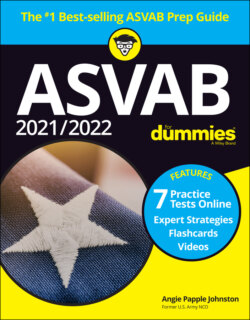Читать книгу 2021 / 2022 ASVAB For Dummies - Angie Papple Johnston - Страница 71
На сайте Литреса книга снята с продажи.
Sounding off by sounding it out
ОглавлениеSometimes you actually know a word because you’ve heard it in conversation, but you don’t recognize it when you see it written down. For instance, a student who’d heard the word placebo (pronounced “plah-see-bow”) knew that it meant an inactive substance, like a sugar pill. But when she came across it in writing, she didn’t recognize it. She thought it was a word pronounced “plah-chee-bow,” which she’d never heard before.
When you see a word on the ASVAB that you don’t recognize, try pronouncing it (not out loud, please) a couple of different ways. The following pronunciation rules can help you out:
Sometimes letters are silent, like the b in subtle or the k in knight. A letter at the end of a word may be silent, especially if the word is French; for instance, coup is pronounced coo.
Some sounds have unusual pronunciations in certain contexts. Think of the first l in colonel, which is pronounced like kernel.
The letter c can sound like s (lice) or k (despicable).
The letter i after a t can form a sound like she. Think of the word initiate.
The letter x at the beginning of a word is generally pronounced like z (Xerox).
A vowel at the end of a word can change the pronunciation of letters in the word. The word wag has a different g sound than the word wage.
When several vowels are right next to each other, they can be pronounced many different ways (consider boo, boa, and bout). Try a couple of different possibilities. For instance, if you see the word feint, you may think that it should be pronounced feent or fiynt, but it in fact sounds like faint. It means fake or pretend.
